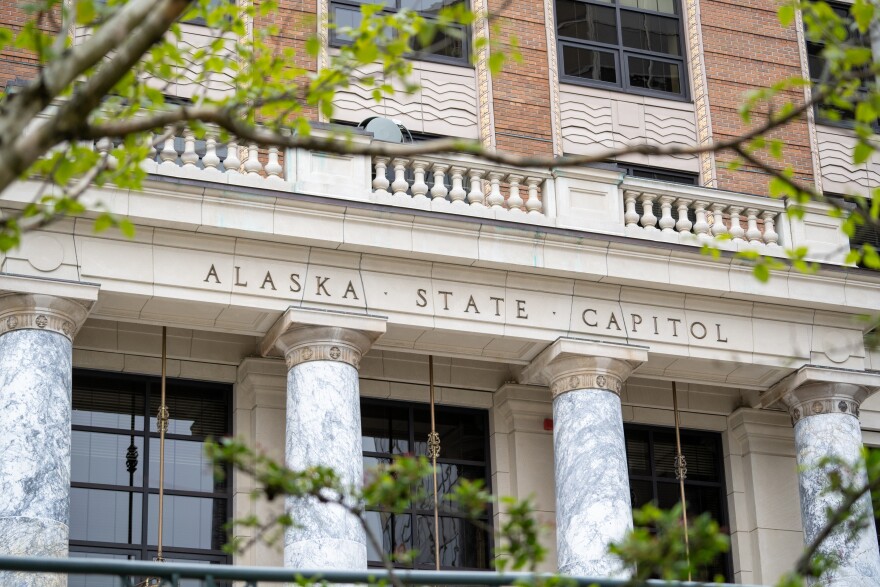The Alaska House is scheduled to vote Wednesday on a change to corporate income taxes that could raise millions of dollars as the state faces deficits and an uncertain financial future.
It’s also tied to funding for two key elements of an education bill pending on the governor’s desk.
Senate Bill 113 would change the way many companies calculate their state corporate income taxes. Backers are pitching it as a tax on large, out-of-state businesses. Sen. Bill Wielechowski, D-Anchorage, told the House Finance Committee on Friday that the bill would change the state’s corporate income tax system to require businesses to pay taxes on the money they bring in from Alaska customers.
“If you buy a Netflix subscription, instead of Netflix claiming the sale occurred at its headquarters in Los Gatos, California, or at its server farm in Texas, the sale is deemed to have occurred where the service is delivered — under this bill, in Alaska,” Wielechowski said.
In a related change, for companies who do a majority of their Alaska business over the internet, the bill would change the corporate income tax formula to look primarily at sales.
The corporate income tax formula currently takes companies’ Alaska payroll and property into account, which means lower taxes for corporations that don’t have much of a physical presence in the state. That means those companies aren’t paying their fair share for state infrastructure like roads, bridges and ports, Wielechowski said.
“Guess who's picking up the tab for that? Alaskan consumers, Alaskan businesses. That is not fair to our brick and mortar companies,” Wielechowski said. “In fact, I would argue that's taking Alaskans’ Permanent Fund dividend checks. That's taking money out of Alaskans’ pockets, because these out-of-state corporations are not paying what they should be paying.”
The bill enjoyed broad support in the Senate, where it passed 16-4 with crossover votes from two Republicans in the minority caucus. The bill would only apply to so-called C corporations, which are typically large businesses, and would not change corporate income tax rates or brackets.
Rep. Jamie Allard, R-Eagle River, said she was concerned the bill could result in higher prices for Alaska consumers.
“I think it's going to impact people greatly,” she said. “I feel like this is a hidden cost to Alaskans.”
At least 36 other states, from Alabama to Hawaii, have made similar changes to their tax codes. Wielechowski said he didn’t think Alaska was a large enough market to make a substantial difference on prices. Across the U.S., he said, no matter a state’s corporate income taxes, a Netflix subscription is the same price.
At least two House minority Republicans on the House Finance Committee agreed. Rep. Jeremy Bynum, R-Ketchikan, said he doesn’t expect the bill to result in across-the-board price increases.
“Whether it's Netflix or some other digital company, when they're paying taxes, they build that into their taxing or into their pricing structure overall,” Bynum said. “Could it cause prices to go up? Maybe. Maybe, in the big scheme of things. … But will they have an Alaska tax? I don't believe so.”
Another minority Republican, Rep. Will Stapp, R-Fairbanks, said he thought taxing out-of-state businesses would level the playing field for Alaska businesses looking to compete with them.
“Where I live, in Fairbanks, everyone has seen these small businesses go out of business and be replaced by big, national chains,” he said. “Perhaps if we didn't tax our local businesses unfavorably compared to the ones who don't live here, fewer of them would go out of business.”
The state’s tax division says the bill could raise $25 to $65 million. If House lawmakers greenlight the bill, it would be the first significant revenue bill to pass this year as lawmakers reckon with large deficits.
Money from the bill would go toward incentive grants for school districts rewarding student reading performance and bolster career and technical education. Lawmakers tied the two programs to the tax bill because of the looming deficits.
If lawmakers in the House approve it, it will go to Gov. Mike Dunleavy. It’s not clear whether he’d sign it. His press office said by email that Dunleavy will make a decision if the bill reaches his desk.


